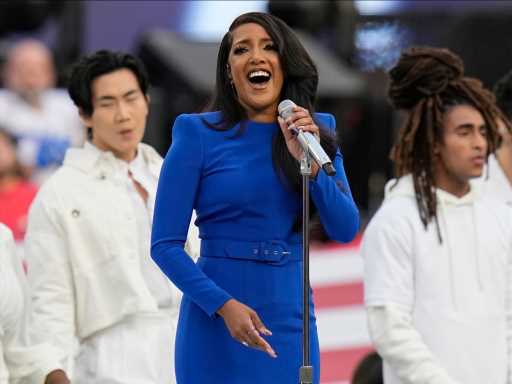On Feb. 1, former Miami Dolphins coach Brian Flores filed a lawsuit against the NFL and the Dolphins, Broncos, and Giants alleging discrimination in both his interviews and his firing earlier this year. The class action complaint references the work of Martin Luther King Jr., Harriet Tubman, and other civil rights leaders before decrying the racially discriminative practices he alleges occur within the NFL, including but not limited to his own treatment. Just a few weeks later, at Super Bowl LVI, the show opens with an elite slate of Black performers: gospel duo Mary Mary singing “Lift Every Voice and Sing,” known by many as the Black national anthem, singer Jhené Aiko singing “America Is Beautiful,” and country star Mickey Guyton performing “The Star-Spangled Banner.” As the game kicks off, fans notice “END RACISM” written in the end zones. And naturally, Twitter had some thoughts.
Writer Britni Danielle was one of many to share those thoughts, writing: “The NFL starting the #SuperBowl with the Black National Anthem is wild considering they’re being sued by Brian Flores for being racist AF and Kaep is still out of a job.“
Former 49ers starter Colin Kaepernick began kneeling during the national anthem in 2016, describing the gesture as a peaceful protest and a method of raising awareness about racial inequality and police brutality. Many players began to join Kaepernick, and the gesture drew the ire of many — former president Donald Trump among them — who described it as unpatriotic. In 2017, Kaepernick opted out of his 49ers contract and became a free agent, and he hasn’t played on an NFL team since.
A few hours before the game, Congresswoman Pramila Jayapal also took to Twitter to share her thoughts on the NFL and racism, generally: “Today, on Superbowl Sunday, don’t forget that for *years* the NFL has systematically villainized Colin Kaepernick because he dared to protest racial injustice, police brutality, and anti-Blackness.”
Kaepernick and Reid ultimately filed a collusion lawsuit against the NFL which they settled in 2019, but Brian Flores’ 2022 lawsuit is a reminder that their swift apparent retaliation for Kaepernick and Reid’s act of peaceful protest may not even be their most recent red flag when it comes to the values of the organization behind the Super Bowl.
Having Black performers singing songs with an important history in the Black community is a nice gesture of wanting the Super Bowl to represent all Americans, and a gesture the NFL was likely eager to make given Flores’ recent allegations. But fans (and critics) are wary that the gesture will be just that, and take the place of real change. Hiring Black performers for an annual show isn’t an adequate replacement for treating Black coaches and players with the respect they deserve, and we hope the NFL will be open to making some less visible changes too.
Before you go, click here to see Super Bowl commercials we’re excited for in 2022.

Source: Read Full Article
